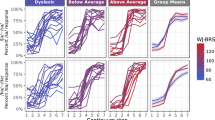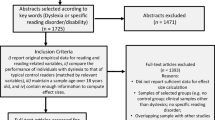Abstract
Children with hyperlexia who learn to readspontaneously before the age of five are impaired inreading and listening comprehension but have wordrecognition skills well above their measured cognitiveand linguistic abilities. In a previous study, theauthor administered a battery of cognitive, academicachievement, and phonemic awareness tests to threechildren classified as hyperlexic. The findingsshowed that the levels of phonemic awareness of thesechildren were low and not commensurate with their wordreading skill. In the present study, the authorreevaluated the three children approximately 7–8 yearslater with the same battery of cognitive, academicachievement, and phonemic awareness tests as well asseveral additional measures of phonemic awareness. The results showed that all three childrens' levels ofphonemic awareness were still low and not commensuratewith their word reading skill. Other findings showedthat two of the children, both of whom had remained inspecial education classes since the previous study,continued to be voracious readers. The other child,who had always been in regular education classes, hadnot read very much for several years. Findings alsoshowed that the word recognition skills of two of thechildren, including the child who had always attendedregular education, had decreased by one to twostandard deviations.
Similar content being viewed by others
References
Aaron, P.G. (1989). Dyslexia and hyperlexia. Dordrecht, Netherlands: Kluwer Academic.
Aaron, P.G. (1991). Can reading disabilities be diagnosed without using intelligence tests?, Journal of Learning Disabilities 24: 178-191.
Aram, D. (1997). Hyperlexia: Reading without meaning in young children, Topics in Language Disorders 17: 1-13.
Aram, D. & Healy, J. (1987). Hyperlexia: A review of extraordinary word recognition. In: L.K. Obler & D. Fein (eds.), The exceptional brain (pp. 70-102). New York: Guilford Press.
Aram, D., Rose, D. & Horwitz, S. (1984). Hyperlexia: Developmental reading without meaning. In: R. Joshi & H. Whitaker (eds.), Dyslexia: A global issue (pp. 517-531). The Hague, Netherlands: Martinus Nijhoff.
Berard, G. (1993). Hearing equals behavior. New Canaan, CT: Keats Publishing.
Bradley, L. & Bryant, P. (1983). Categorizing sounds and learning to read: A causal connection, Nature 30: 419-421.
Brady, S. & Shankweiler, D. (eds.) (1991). Phonological processes in literacy. Hillsdale, NJ: Erlbaum.
Cunningham, A. & Stanovich, K. (1990). Assessing print exposure and orthographic processing skill in children: A quick measure of reading experience, Journal of Educational Psychology 82: 733-740.
Cunningham, A. & Stanovich, K. (1993). Children's literacy environments and early word recognition skills, Reading and Writing: An Interdisciplinary Journal 5: 193-204.
Dunn, L. & Dunn, L. (1981). Peabody picture vocabulary test-revised. Circle Pines, MN: American Guidance.
Frith, U. & Snowling, M. (1983). Reading for meaning and reading for sound in autistic and dyslexic children, British Journal of Developmental Psychology 1: 329-342.
Glosser, G., Friedman, R. & Roeltgen, D. (1996). Clues to the cognitive organization of reading and writing from developmental hyperlexia, Neuropsychology 10: 168-175.
Glosser, G., Grugan, P. & Friedman, R. (1997). Semantic memory impairment does not impact on phonological and orthographic processing in a case of developmental hyperlexia, Brain and Language 56: 234-247.
Goldberg, T. & Rothermel, R. (1984). Hyperlexic children reading, Brain 107: 759-785.
Hammill, D. & Larsen, S. (1994). Test of written spelling-3. Austin, TX: Pro-Ed.
Healy, J. (1982). The enigma of hyperlexia, Reading Research Quarterly 17: 319-338.
Healy, J., Aram, D., Horwitz, S. & Kessler, J. (1982). A study of hyperlexia, Brain and Language 17: 1-23.
Kaufman, A. & Kaufman, N. (1990). Kaufman brief intelligence test. Circle Pines, MN: American Guidance.
Lindamood, C. & Lindamood, P. (1979). Lindamood auditory conceptualization test. Austin, TX: Pro-Ed.
O'Connor, N. & Hermelin, B. (1994). Two autistic savant readers, Journal of Autism and Developmental Disorders 24: 501-515.
Pennington, B., Van Orden, G., Smith, S., Green, P. & Haith, M. (1990). Phonological processing skills and deficits in adult dyslexics, Child Development 61: 1753-1778.
Rispens, J. & Van Berckelaer, I. (1991). Hyperlexia: Definition and criterion. In: R. Joshi (ed.), Written language disorders (pp. 143-163). Dordrecht, Netherlands: Kluwer.
Rosner, J. & Simon, D. (1971). The auditory analysis: An initial report, Journal of Learning Disabilities 4: 40-48.
Seymour, P. & Evans, H. (1992). Beginning reading without semantics: A cognitive study of hyperlexia, Cognitive Neuropsychology 9: 89-122.
Siegel, L. (1984). A longitudinal study of a hyperlexic child: Hyperlexia as a language disorder, Neuropsychologia 22: 577-585.
Siegel, L. (1994). The modularity of reading and spelling: Evidence from hyperlexia. In: G. Brown & N. Ellis (eds.), Handbook of spelling: Theory, process, and intervention (pp. 227-248). United Kingdom: Wiley & Sons.
Siegel, L., Share, D. & Geva, E. (1995). Evidence for superior orthographic skills in dyslexics, Psychological Science 6: 250-254.
Snowling, M. & Frith, U. (1986). Comprehension in “hyperlexic” readers, Journal of Experimental Child Psychology 42: 392-415.
Sparks, R. (1995). Phonemic awareness in hyperlexic children, Reading and Writing: An Interdisciplinary Journal 7: 217-235.
Stanovich, K. (1991). Word recognition: Changing perspectives. In: R. Barr, M. Kamil, P. Mosenthal & P. Pearson (eds.), Handbook of reading research, Vol. 2 (pp. 418-452). New York: Longman.
Stanovich, K., Cunningham, A. & Cramer, B. (1984). Assessing phonological awareness in kindergarten children, Journal of Experimental Child Psychology 38: 175-190.
Stanovich, K. & West, R. (1989). Exposure to print and orthographic processing, Reading Research Quarterly 24: 402-433.
Temple, C. (1990). Auditory and reading comprehension in hyperlexia: Semantic and syntactic skills, Reading and Writing: An Interdisciplinary Journal 2: 297-306.
Wiig, E. & Secord, W. (1989). Test of language competence-expanded edition. San Antonio, TX: Psychological Corp.
Wechsler, D. (1991). Wechsler intelligence scale for children-III. San Antonio, X: Psychological Corp.
Whitehouse, D. & Harris, J. (1984). Hyperlexia in infantile autism, Journal of Autism and Developmental Disorders 14: 281-289.
Wiederholt, L. & Bryant, B. (1986). Gray oral reading test-revised. Austin, TX: Pro-Ed.
Woodcock, R. (1987). Woodcock reading mastery test-revised. Circle Pines, MN: American Guidance.
Woodcock, R. & Johnson, M.B. (1978). Woodcock-Johnson psychoeducational battery: Tests of cognitive ability. Chicago, IL: Riverside.
Woodcock, R. & Johnson, M.B. (1989). Woodcock-Johnson-revised: Tests of achievement. Chicago, IL: Riverside.
Author information
Authors and Affiliations
Rights and permissions
About this article
Cite this article
Sparks, R.L. Phonemic awareness and reading skill in hyperlexic children: A longitudinal study. Reading and Writing 14, 333–360 (2001). https://doi.org/10.1023/A:1011131125517
Issue Date:
DOI: https://doi.org/10.1023/A:1011131125517




